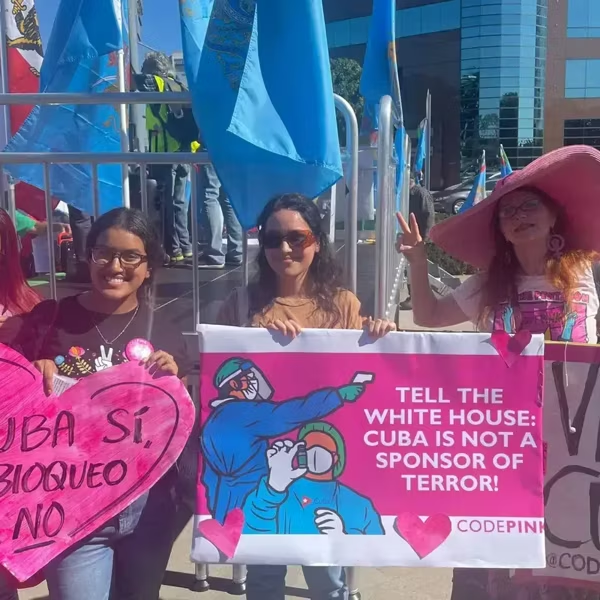Hasta Siempre, Fidel Castro
The passing of Fidel Castro is one of those events that highlights a deep divide that separates the United States from most of the world.
While the mainstream media in the United States reports from the frontlines of Miami where exiles celebrate in the streets the death of who they characterize as an authoritarian dictator, condolences and tributes pour in from the rest of the world for the revolutionary leader.
Was Castro a "brutal dictator," as President-elect Donald Trump tweeted, or a hero?
It depends, of course, on one's perspective.
The passing of Fidel Castro is one of those events that highlights a deep divide that separates the United States from most of the world.
While the mainstream media in the United States reports from the frontlines of Miami where exiles celebrate in the streets the death of who they characterize as an authoritarian dictator, condolences and tributes pour in from the rest of the world for the revolutionary leader.
Was Castro a "brutal dictator," as President-elect Donald Trump tweeted, or a hero?
It depends, of course, on one's perspective.
Those who left Cuba in the aftermath of the 1959 revolution had benefited from an unequal, repressive, and exclusionary political system. More than half a century later, they still dream of returning to their lives of luxury and privilege.
Castro, in contrast, led his revolution on behalf of the downtrodden who had not gained from that system.
Once in power, Castro led a transformation of Cuban society. He believed that property should not be seen as a right, but should serve a social function. The government nationalized foreign-owned industries, expropriated large estates, and distributed land to peasants. The revolutionaries wanted to remake the country so that the island's resources benefited the Cuban people rather than foreign capitalist enterprises.
The result of these revolutionary policies was a radical downward redistribution of wealth. The new revolutionary government lowered rents and utilities, and providing free social services to the public. Workers' wages rose 40 percent, purchasing power rose 20 percent, and unemployment disappeared as everyone was assured of a job.
The government converted military barracks into schools and hospitals. A literacy campaign sent students out into the countryside to teach almost a million people to read and write. The campaign raised literacy levels from 76 percent before the revolution to 96 percent in 1962, the highest in Latin America and a level that rivaled that of wealthy industrialized countries.
All Cuban schools were now public and free, as was healthcare. For the first time in their lives, many Cubans were able to see a medical doctor. The government also opened private beaches and social clubs to the general public.
Cuba was for the Cubans--not for a small wealthy ruling class, and especially not for foreigners.
Fidel Castro's willingness to stand up to the United States gained him respect and admiration throughout Latin America. Long suffering under the imperial thumb of their neighbor to the north, Castro's appeals to nationalism and anti-imperialism gained him support throughout the hemisphere, even from those who might not otherwise support his communist ideology.
Cuba rallied to the cause of revolutionary and anti-colonial movements around the world. Particularly in Africa, Cubans supported the Algerian National Liberation Front in its fight against French colonialism, a revolutionary struggle in the Congo, and Angolan independence that led to the end of apartheid in South Africa.
No wonder people in much of the world admired the Cuban revolutionaries, and wanted to emulate their successes in their own countries.
Because of those gains and what the Cuban Revolution represents, we now declare, Hasta Siempre, Fidel Castro!
An Urgent Message From Our Co-Founder
Dear Common Dreams reader, The U.S. is on a fast track to authoritarianism like nothing I've ever seen. Meanwhile, corporate news outlets are utterly capitulating to Trump, twisting their coverage to avoid drawing his ire while lining up to stuff cash in his pockets. That's why I believe that Common Dreams is doing the best and most consequential reporting that we've ever done. Our small but mighty team is a progressive reporting powerhouse, covering the news every day that the corporate media never will. Our mission has always been simple: To inform. To inspire. And to ignite change for the common good. Now here's the key piece that I want all our readers to understand: None of this would be possible without your financial support. That's not just some fundraising cliche. It's the absolute and literal truth. We don't accept corporate advertising and never will. We don't have a paywall because we don't think people should be blocked from critical news based on their ability to pay. Everything we do is funded by the donations of readers like you. Will you donate now to help power the nonprofit, independent reporting of Common Dreams? Thank you for being a vital member of our community. Together, we can keep independent journalism alive when it’s needed most. - Craig Brown, Co-founder |
The passing of Fidel Castro is one of those events that highlights a deep divide that separates the United States from most of the world.
While the mainstream media in the United States reports from the frontlines of Miami where exiles celebrate in the streets the death of who they characterize as an authoritarian dictator, condolences and tributes pour in from the rest of the world for the revolutionary leader.
Was Castro a "brutal dictator," as President-elect Donald Trump tweeted, or a hero?
It depends, of course, on one's perspective.
Those who left Cuba in the aftermath of the 1959 revolution had benefited from an unequal, repressive, and exclusionary political system. More than half a century later, they still dream of returning to their lives of luxury and privilege.
Castro, in contrast, led his revolution on behalf of the downtrodden who had not gained from that system.
Once in power, Castro led a transformation of Cuban society. He believed that property should not be seen as a right, but should serve a social function. The government nationalized foreign-owned industries, expropriated large estates, and distributed land to peasants. The revolutionaries wanted to remake the country so that the island's resources benefited the Cuban people rather than foreign capitalist enterprises.
The result of these revolutionary policies was a radical downward redistribution of wealth. The new revolutionary government lowered rents and utilities, and providing free social services to the public. Workers' wages rose 40 percent, purchasing power rose 20 percent, and unemployment disappeared as everyone was assured of a job.
The government converted military barracks into schools and hospitals. A literacy campaign sent students out into the countryside to teach almost a million people to read and write. The campaign raised literacy levels from 76 percent before the revolution to 96 percent in 1962, the highest in Latin America and a level that rivaled that of wealthy industrialized countries.
All Cuban schools were now public and free, as was healthcare. For the first time in their lives, many Cubans were able to see a medical doctor. The government also opened private beaches and social clubs to the general public.
Cuba was for the Cubans--not for a small wealthy ruling class, and especially not for foreigners.
Fidel Castro's willingness to stand up to the United States gained him respect and admiration throughout Latin America. Long suffering under the imperial thumb of their neighbor to the north, Castro's appeals to nationalism and anti-imperialism gained him support throughout the hemisphere, even from those who might not otherwise support his communist ideology.
Cuba rallied to the cause of revolutionary and anti-colonial movements around the world. Particularly in Africa, Cubans supported the Algerian National Liberation Front in its fight against French colonialism, a revolutionary struggle in the Congo, and Angolan independence that led to the end of apartheid in South Africa.
No wonder people in much of the world admired the Cuban revolutionaries, and wanted to emulate their successes in their own countries.
Because of those gains and what the Cuban Revolution represents, we now declare, Hasta Siempre, Fidel Castro!
The passing of Fidel Castro is one of those events that highlights a deep divide that separates the United States from most of the world.
While the mainstream media in the United States reports from the frontlines of Miami where exiles celebrate in the streets the death of who they characterize as an authoritarian dictator, condolences and tributes pour in from the rest of the world for the revolutionary leader.
Was Castro a "brutal dictator," as President-elect Donald Trump tweeted, or a hero?
It depends, of course, on one's perspective.
Those who left Cuba in the aftermath of the 1959 revolution had benefited from an unequal, repressive, and exclusionary political system. More than half a century later, they still dream of returning to their lives of luxury and privilege.
Castro, in contrast, led his revolution on behalf of the downtrodden who had not gained from that system.
Once in power, Castro led a transformation of Cuban society. He believed that property should not be seen as a right, but should serve a social function. The government nationalized foreign-owned industries, expropriated large estates, and distributed land to peasants. The revolutionaries wanted to remake the country so that the island's resources benefited the Cuban people rather than foreign capitalist enterprises.
The result of these revolutionary policies was a radical downward redistribution of wealth. The new revolutionary government lowered rents and utilities, and providing free social services to the public. Workers' wages rose 40 percent, purchasing power rose 20 percent, and unemployment disappeared as everyone was assured of a job.
The government converted military barracks into schools and hospitals. A literacy campaign sent students out into the countryside to teach almost a million people to read and write. The campaign raised literacy levels from 76 percent before the revolution to 96 percent in 1962, the highest in Latin America and a level that rivaled that of wealthy industrialized countries.
All Cuban schools were now public and free, as was healthcare. For the first time in their lives, many Cubans were able to see a medical doctor. The government also opened private beaches and social clubs to the general public.
Cuba was for the Cubans--not for a small wealthy ruling class, and especially not for foreigners.
Fidel Castro's willingness to stand up to the United States gained him respect and admiration throughout Latin America. Long suffering under the imperial thumb of their neighbor to the north, Castro's appeals to nationalism and anti-imperialism gained him support throughout the hemisphere, even from those who might not otherwise support his communist ideology.
Cuba rallied to the cause of revolutionary and anti-colonial movements around the world. Particularly in Africa, Cubans supported the Algerian National Liberation Front in its fight against French colonialism, a revolutionary struggle in the Congo, and Angolan independence that led to the end of apartheid in South Africa.
No wonder people in much of the world admired the Cuban revolutionaries, and wanted to emulate their successes in their own countries.
Because of those gains and what the Cuban Revolution represents, we now declare, Hasta Siempre, Fidel Castro!

